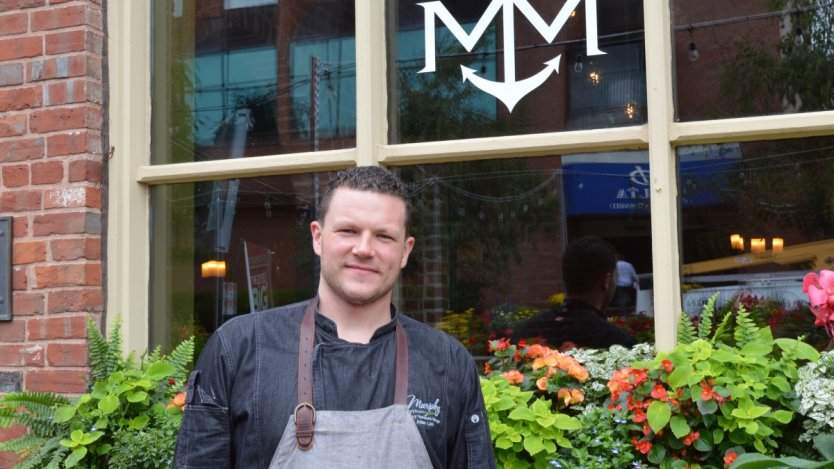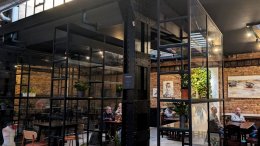As a born and raised islander, chef Adam Loo knows a thing or two about eating seasonally on Prince Edward Island. As the son of P.E.I.’s most well-known, boundary-pushing organic farmer, Raymond Loo, who passed away suddenly a few years ago, he also knows the work ethic and drive required to succeed in the restaurant industry. Soon to be appointed as the culinary operations manager for the Murphy Hospitality Group, the largest restaurant group on the island, Loo shares what he has learned while moving up the ranks in the company, and what changes he intends to implement in his new position.
Tell me a bit more about what your time at the Merchantman has looked like.
When the Murphy’s bought it, they wanted to change the concept to a seafood restaurant, so we renovated the kitchen and made a bunch of changes. We went through a pretty rocky first year. We decided to make some changes because people were getting burnt out. I actually didn’t have a sous chef for about eight months, but I had a lot of really good staff. I put more of the emphasis on five or six key people instead of just one. Over time, we hit our stride. We went through an extensive exercise in menu engineering with all the staff. We had about 12 people working on the menu instead of just one or two. That ended up paying dividends big time because we established our top 10 staples that people come here for.
What does your clientele look like?
We targeted the local clientele first, instead of tourism. We intentionally targeted the off-season. We thought it was important to hit home with locals because I’m local and a lot of our staff are, so we know what it’s like trying to eat out here when the tourist season ends. It has helped us with tourism in the summers too because everyone wants to know where the locals eat. They ask people, and the locals refer them to us.
You mentioned menu changes, what did those entail?
We weren’t just changing the food, we were changing the atmosphere and environment for the kitchen. We had all the cooks help engineer the menu. We would have sessions for about an hour a week, talking about waste management, financials, line design and all these other things that chefs have skills in but cooks might not.
Chefs and sous chefs are often put into their positions because they are the strongest cooks. You don’t necessarily have the skills it takes to run a kitchen. We wanted to teach the people who were working for us these things so we will have better retention and people will be more interested in their jobs because they understand them better. Instead of just pumping out food, we really targeted why we were doing the things we were doing. We connected the dots between needing to work, loving people, and loving food. Building a team is crucial, but you need to build your culture first and then introduce your team to it.
Have you seen increased retention from your efforts?
The staff we have, a lot of them have worked with me for three or four years now, straight. We spent a lot of time asking, “What will make your job easier?”
We started asking questions about menu items like: How does this affect prep? How does it affect working on the line? How many steps does it take? How long does it take to cook?
All of a sudden, we were improving our prep time, improving our chit time, and improving our execution time.
This summer was when we saw our biggest sales and best chit times. We’ve had the same retention of staff. I’ve hired four people in the past 12 to 18 months. One person who started as a dishwasher is now one of my full-time guys. We’ve built from within; we’ve built a culture where you start with us, you learn your two stations, and then you can grow and grow and grow. Our day and night people have a revolving schedule. Tonight, we’ve got three people, and tomorrow, it could be four completely different people. Everyone is cross-trained and they know what they’re doing. It frees up the schedule to grant people’s time-off requests. Everyone is fresh when they come in. Cooks aren’t coming in at 10 a.m. and working until 12 a.m.
What’s your average shift length?
Eight hours. I try not to reach outside of that. If people want more hours, I will give them an extra shift, but not extend their shifts. We’ve had the least amount of overtime in the company. Normally you’d reach this point in the summer and everyone would be burnt out. It’s a big accomplishment. A lot of it has to do with the staff. They’ve bought into the concept. We’ve built a culture where everyone looks out for each other. Accountability is a pillar for us.
How do you foster this accountability and get people to look out for each other?
My new staff work directly with me because you are only as strong as your weakest link. We make sure all of our weaker links are getting stronger and stronger, so when a new weaker link comes in, one of the stronger ones can teach them. It’s an “I teach you, you teach me” culture. I hire to my weaknesses. That’s why a lot of my staff has different strengths than I have, and they are told that. If you don’t know your weaknesses, you’ll have a lot of difficulties hiring.
Was there anything that triggered the changes?
There’s no question that it correlates directly to my personal life. In 2013, my father passed away suddenly of cancer. He got sick in January and I got offered the job in early spring. Initially I was going to decline it but he told me absolutely not. He was known for being an innovator in organic farming and wanting to change ways. He was very intelligent and intricate in making decisions, but wasn’t afraid to take risks. He’d always find a way to do things and wouldn’t let others tell him he couldn’t.
Going through that tragic loss helped me realize that the time for change is now and I don’t have to wait. Maybe I can’t change the whole industry, or my team can’t change the whole industry, but we can change what is happening within our four walls. If that spreads to another four walls, then change can happen.
You’ll soon be taking on the role of culinary operations manager with the Murphy Group. What will that look like for you?
My goal is to give a voice to the back of house and everyone who hasn’t had a voice at the higher level. I want to give them the chance to be part of change. Another thing is the expectation that chefs have to keep up with everything and maintain a personal work life balance. It’s the biggest challenge in industry across the board. How do we address things we all know are the norm? That’s why we introduced the revolving schedule so everyone can get certain holidays off and two full days off a week disconnected from here, with the expectation that they will be fresh and ready to go once they’re here.
Any words of wisdom to cooks fresh out of the Culinary Institute of Canada (CIC)?
The biggest thing I share when I talk to students is to get to know yourself first. A lot of us make the mistake or misjudgment that we want to work in a certain place or certain environment. I learned that myself. I got a chance to do the fine dine thing. You want to make yourself the biggest asset possible. That’s more than just what skills you have in the kitchen. You may have the best knife skills but you need to be able to sell it. It’s a people industry. We call it the food industry, but the people are why we do it. We are in the service industry, the people industry. Ultimately, that’s what matters, the people you work with. As a young person, get to know what you want, identify your weaknesses up front, and come to terms with that. Your career should be spent trying to better your weaknesses, rather than trying to show off your strengths. If you better your weaknesses, you’ll have more strengths in the long run.













